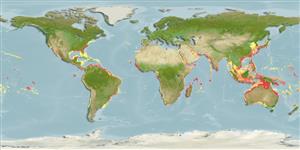>
Tetraodontiformes (Puffers and filefishes) >
Monacanthidae (Filefishes)
Etymology: Aluterus: Name from Greek meaning not free or detached, referring to the pelvis that does not form a spiny project (as it does in triggerfish) (R. Chandler, pers. Comm. 10/2014).
More on author: Linnaeus.
Environment: milieu / climate zone / depth range / distribution range
экология
морской ассоциированный с рифами; пределы глубины 1 - 80 m (Ref. 90102). Subtropical; 43°N - 39°S, 180°W - 180°E
Circumtropical. Western Atlantic: Massachusetts, USA to Argentina (Ref. 36453). Eastern Atlantic: west coast of tropical Africa (Ref. 3592). Eastern Pacific: Guatemala to Chile (Ref. 9068); probably in Mexico (Ref. 9318). Western Indian Ocean: Mozambique and South Africa (Ref. 4421). Recently recorded from Reunion (Ref. 53568).
Size / Вес / Возраст
Maturity: Lm ? range ? - ? cm
Max length : 76.2 cm TL самец/пол неопределен; (Ref. 26340); common length : 40.0 cm TL самец/пол неопределен; (Ref. 3467); наибольший вес (опубликованные данные): 2.7 kg (Ref. 40637)
колючие лучи спинного плавника (общее число) : 2; членистые (мягкие) лучи спинного плавника (общее число) : 45 - 52; колючие лучи анального плавника: 0; членистые (мягкие) лучи анального плавника: 47 - 53. Rudimentary pelvic spine disappears in large specimen (Ref. 36453). Snout convex in adults (Ref. 1602). Sandy to grey with small brown spots above; soft dorsal and anal fins pale yellowish to brownish; caudal membrane blackish brown (Ref. 4421).
Occasionally in shallow water by steep drop-offs. Solitary or in pairs, occasionally in groups of five or six, at less than 10 m depth. Juveniles are pelagic, seen under floating objects (Ref. 9318, 48637). Benthopelagic (Ref. 58302). Adults and juveniles are rarely seen near reefs. Juveniles often with large jellies and these may bring them close to reefs and adults may nest on sandflats adjacent to reefs in deep water. At other times, the adults may form large schools under weed-rafts that usually form during the wet season (Ref. 48637). Feed on benthic organisms (Ref. 30573).
Life cycle and mating behavior
половая зрелость | размножение | нерест | икра | Fecundity | личинки
Distinct pairing (Ref. 205).
Harmelin-Vivien, M.L. and J.-C. Quéro, 1990. Monacanthidae. p. 1061-1066. In J.C. Quero, J.C. Hureau, C. Karrer, A. Post and L. Saldanha (eds.) Check-list of the fishes of the eastern tropical Atlantic (CLOFETA). JNICT, Lisbon; SEI, Paris; and UNESCO, Paris. Vol. 2. (Ref. 3592)
Статус Красного Списка МСОП (Ref. 130435: Version 2024-2)
Угроза для людей
Reports of ciguatera poisoning (Ref. 30911)
Использование человеком
рыболовство: коммерческий; объект спортивного рыболовства: да
дополнительная информация
инструменты
Специальные отчеты
Скачать в формате XML
ресурсы в Интернет
Estimates based on models
Preferred temperature (Ref.
123201): 22.8 - 29, mean 27.6 °C (based on 1868 cells).
Phylogenetic diversity index (Ref.
82804): PD
50 = 0.5625 [Uniqueness, from 0.5 = low to 2.0 = high].
Bayesian length-weight: a=0.01905 (0.01192 - 0.03047), b=2.89 (2.75 - 3.03), in cm total length, based on LWR estimates for this species & (Sub)family-body (Ref.
93245).
Trophic level (Ref.
69278): 3.8 ±0.0 se; based on diet studies.
Generation time: 5.0 ( na - na) years. Estimated as median ln(3)/K based on 1
growth studies.
устойчивость к внешним воздействиям (Ref.
120179): средний (среднего размера), минимальное время удвоения популяции 1.4-4.4 года (Preliminary K or Fecundity.).
Fishing Vulnerability (Ref.
59153): Moderate to high vulnerability (48 of 100).
Nutrients (Ref.
124155): Calcium = 13.9 [5.6, 53.9] mg/100g; Iron = 0.487 [0.214, 1.238] mg/100g; Protein = 19.3 [17.1, 21.4] %; Omega3 = 0.154 [0.071, 0.304] g/100g; Selenium = 21.9 [8.3, 50.9] μg/100g; VitaminA = 23.4 [6.0, 98.0] μg/100g; Zinc = 0.522 [0.321, 0.882] mg/100g (wet weight);
